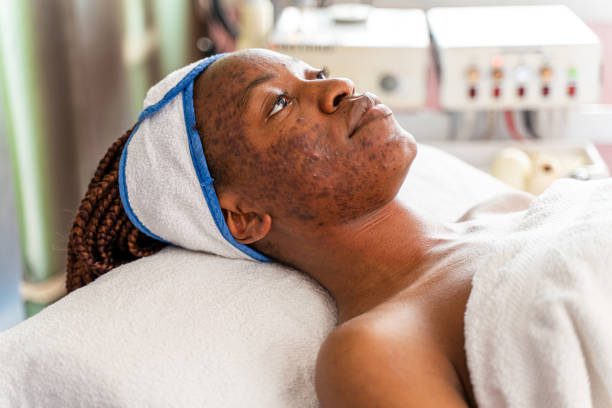Did you know that acne, including blackheads, breakouts, blemishes, and skin peels, affects over 50 million individuals in the United States? Acne breakouts can be tough, but acne scars, blackheads, and blemishes can make things even harder. These scars, also known as blemishes, happen when the skin gets inflamed during acne breakouts and can make you feel less confident.
Key Takeaways
- Prevent Scarring: Avoid picking or squeezing acne to prevent scars from forming.
- Early Treatment: Get help early for pimples, acne blemishes, severe acne, acne breakouts, and acne lesions to stop scars.
- Natural Remedies: Try using aloe vera or tea tree oil to help get rid of acne scars at home.
- Patience is Key: It takes time for acne scars to go away, so be patient.
- Consult a Professional: If you don’t know how to treat acne scars, acne blemishes, severe acne, or acne lesions, ask a skin doctor for help.
- Protect Your Skin: Keep scars soft and safe by using Vaseline.
Understanding Acne Scars
Acne Scars Overview
Acne scars are marks that stay on the skin after bad acne. They can make people feel sad and less sure of themselves, especially when dealing with acne breakouts and scar tissue. Acne scars can make people feel shy and not good about themselves.
If you have acne scars, you might feel sad and worried when you see reminders of your past skin problems. These reminders can make them feel bad about how they look. Getting help from a counselor might help them feel better.
There are different types of acne scars: ice pick, rolling, boxcar, and keloid. Ice pick scars are tiny holes, rolling scars are wavy, boxcar scars are wide with sharp edges, and keloid scars grow bigger than the first cut. Knowing these types helps choose the best treatment for each person.
Types of Scars
- Ice pick scars: Deep and narrow indentations on the skin.
- Rolling scars: Wavy textures that give a rolling appearance.
- Boxcar scars: Wider depressions with well-defined edges.
- Keloid scars: Overgrown scar tissue extending beyond the initial wound area.
Keloid scars grow big on skin, while ice pick scars look like small holes. Knowing the difference helps doctors choose the right treatment for acne scars.
Ice pick scars are tiny holes in the skin that are hard to treat. Dermatologists use different methods like lasers or fillers to fix different acne scars.
Prevalence
Statistics show that around 80% of individuals aged between 11 and 30 years will experience acne scarring at some point in their lives. Acne is a big problem for many young people. It can leave scars on the skin that last a long time. This affects people of all ages and backgrounds around the world.
Acne scars happen a lot around the world. Teens and adults can get them because of acne. Knowing how common acne scars are helps people find ways to prevent and treat them.
Acne scars are a big worry for many people. It’s important to get help early and take good care of your skin to avoid lasting damage. Dermatologists can help you treat scars and stop new ones with special skincare routines.
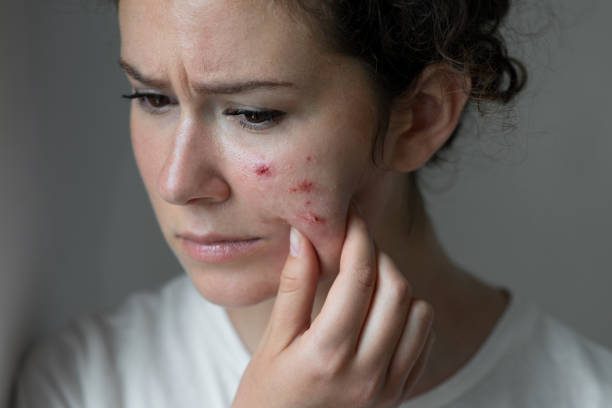

Causes Of Acne Scars?
Genetic Predisposition
Genes decide if you might get acne scars. If your family had bad acne, you might get scars too. Some people’s skin heals differently because of their genes, so they can get scars more easily.
Genes can affect how our skin heals from acne. Some genes control collagen and skin stretchiness, which can lead to scars after pimples.
Hormonal Influences
When your body changes, like during puberty or if you have PCOS, it can make your skin produce more oil. Too much oil can block your pores and cause pimples. If you don’t take care of it, you might end up with scars. Imbalances in your hormones can also slow down how fast your skin heals, making it harder to get rid of scars.
Hormones like testosterone make skin oily and cause acne. Changes in estrogen levels can also affect skin health, making it more likely to get scars from inflammation and infection.
Inflammatory Response
Acne scars happen when the body fights bacteria too much, hurting the skin around. This can cause different types of scars like icepick, rolling, or boxcar scars.
Inflammation is super important for making acne scars like dark spots and raised scars. They happen when our skin makes too much melanin or puts collagen in the wrong place while healing.
Skin Type and Ethnicity
Some people get acne scars more easily because of their skin type. Oily or combo skin can have bad breakouts that leave scars. Also, different skin types from different backgrounds might get scars after acne.
People with dark skin can get dark spots after acne because of more melanin. People with light skin may have red spots from acne.
Environmental Factors
Things like pollution, sun rays, and strong skincare stuff can make acne worse and cause scars. Pollution and sun can hurt the skin, making it easier for acne bacteria to cause trouble.
Don’t use rough stuff on skin that’s sensitive or gets pimples. It can make things worse and cause scars. Protect your skin from bad stuff and pick gentle products that match your skin type.
Psychological Impact
Acne scars can make people feel sad and not good about themselves. They may feel shy or sad because of the scars. It’s important to deal with these feelings to stay happy and confident.
When you feel bad about how you look because of scars on your face, it helps to talk to friends, family, or counselors who can give you advice.
Skin Damage
Acne is bad for skin. It starts when pores get blocked by oil, germs, and dead skin. Germs grow and make skin red and puffy.
If you don’t take care of your skin when you have a lot of pimples, it can hurt your skin for a long time. Pimples make your skin weak and easier to get hurt by things around you. This can leave scars on your skin that won’t go away even after the pimples are gone.
If you pick or squeeze pimples, it can make your skin worse and cause scars. Not taking care of your skin or using harsh treatments can also make things worse. It’s important to know how skin damage leads to scars so you can stop it from happening.
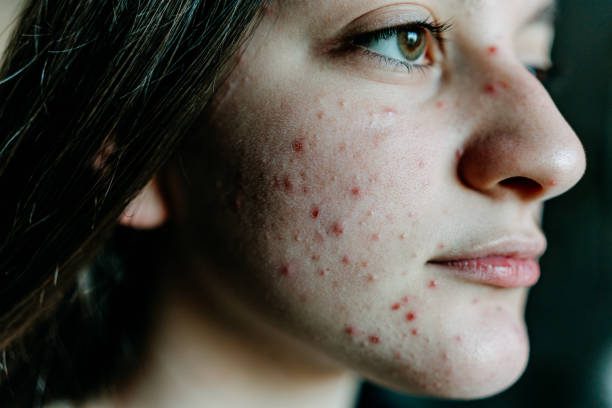

Collagen Production
Collagen helps skin stay firm and bouncy. Acne scars mess up how collagen grows, making skin bumpy.
To make acne scars look better and have healthy skin, do things that help make more collagen. Treatments like microneedling or laser can help with scars. Eating good food with vitamins C and E and drinking enough water also helps make collagen.
To keep your skin healthy and smooth, use skincare stuff with retinol or peptides. Wear sunscreen to stop sun damage that makes you look older.
Impact of Acne Manipulation
Squeezing Risks
Squeezing pimples can hurt your skin and make scars. Pressing too hard can break the skin and let germs in, causing redness and scars. Instead of squeezing, wash gently and use creams suggested by a skin doctor.
Don’t pop pimples ’cause it can make bad scars that are hard to fix. Squeezing can hurt skin layers and cause lasting damage. To avoid scars, don’t squeeze pimples, and ask a pro for help with acne.
Don’t pop pimples to avoid acne scars. Picking at them can make it worse and cause permanent scars. Use creams or laser treatment with help from a skin expert.
Picking Consequences
Picking at pimples makes them worse and can cause scars. It hurts the skin and makes it easier to get dark spots and holes.
Don’t pick at zits! It helps them heal faster and stops scars. Picking can make dark spots or dents. Try to stay mindful or play with toys to stop picking.
To stop acne scars from getting worse, use a skincare routine that fits your skin. Wash gently, use non-clog lotion, and treat with special products like salicylic acid. Stick to your routine to keep acne under control and avoid picking at your skin.
Popping Effects
Don’t pop pimples because it can cause scars and more acne. Be gentle with your skin to avoid problems.
If you pop pimples wrong, it can cause infection and make scars. Use clean tools and be gentle to avoid skin damage and scary.
When you have pimples, don’t squeeze them or pick at them. Use spot treatments with sulfur or tea tree oil instead. If needed, ask a professional for help with safe extraction.
Who Gets Acne Scars
Genetic Factors
Genes decide if you might get acne scars. If your family has bad scarring, you could be more likely to get them too. Genes can affect how your skin reacts to swelling and makes scars. Knowing your genes can help predict if you’ll get acne scars.
Some people have genes that make their skin scar more easily from acne. The type and depth of scars can vary based on genetics. Genetic testing can help predict if someone is likely to get acne scars.
Different genes can decide how well skin heals after pimples, which can affect the chance of getting scars. Studying these genes can help people know how likely they are to get scars. Genetic tests can help find scar risks early and plan treatments that fit each person better.
Skin Type Variations
Skin can get acne scars in different ways. Some skin gets darker spots or raised scars more easily. Oily skin can get worse acne and scars because it makes more oil. Dry skin can have trouble healing scars because it lacks moisture.
Different skin types need different treatments for scars. If you have oily skin, use oil-free products to avoid more pimples. Use the right products for your skin to make scars better without making them worse.
Get special skin tips for acne scars that match your skin. Oily skin? Use stuff that won’t block pores to stop more breakouts. Dry skin? Try hydrating things like hyaluronic acid to help scars look better.
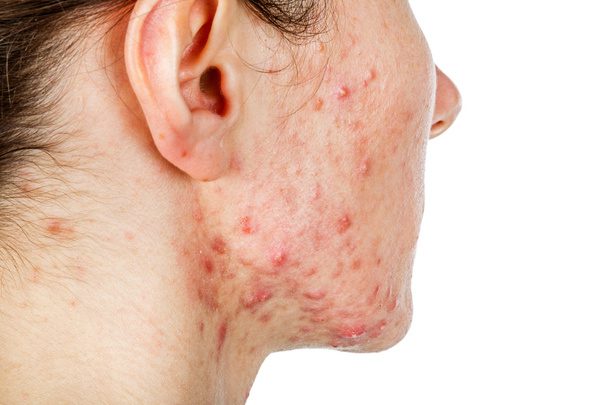

Why do I always have acne scars?
Hormonal Changes
When you grow up, your body changes and makes more oil, which can make your skin get bumps and red spots called acne scars.
Acne scars happen when the skin gets hurt from swelling inside.
Sometimes after a pimple goes away, it can leave a scar because the healing process got messed up.
Picking or Squeezing Pimples
Squeezing or Picking pimples can make skin worse and cause acne scars.
Picking at your skin can make pimples worse and cause scars.
Don’t pick at your skin to avoid making acne worse and getting scars.
Delayed Treatment
Not treating acne early can make it worse and cause scars on your skin.
Going to a skin doctor for acne can help make it better and stop scars later.
Taking care of your skin and treating it regularly can stop new pimples and make acne scars less.
The Formation Process
From Acne to Scar
When you have acne, it can leave scars on your skin. These scars happen when the acne goes deep and hurts the skin. Your body makes collagen to fix the damage, but too much collagen can make raised or pitted scars. The scars can be different based on how bad the acne is.
When you have acne, it can cause scars on your skin. There are two kinds of scars: some make holes in your skin (they’re called atrophic scars), and some make raised bumps (those are keloid scars). It’s important to know about these to stop acne early and avoid getting scars.
When you get pimples, they can leave scars on your skin. It’s important to see a doctor to prevent scars and help your skin heal.
Healing Complications
Acne scars are hard to heal because the skin stays red for a long time and if you don’t take care of it. Redness can slow down healing and make scars worse. Skin problems can mess up how scars get better by messing with collagen and skin regrowth. To fix these problems, talk to skin doctors for special treatment plans.
Certain health issues like hormone problems or autoimmune diseases can affect how scars heal. Taking medicine or changing your habits can help your scars get better. To help scars heal right, keep the boo-boo clean, don’t pick at pimples, and use nice skin stuff from the doctor.
To make acne scars better, you need to think about your health and skincare. Doctors might suggest laser, peels, needles, or dermabrasion based on how bad the scars are. By looking at both inside and outside reasons for scars, you can get smoother skin and feel better about yourself.
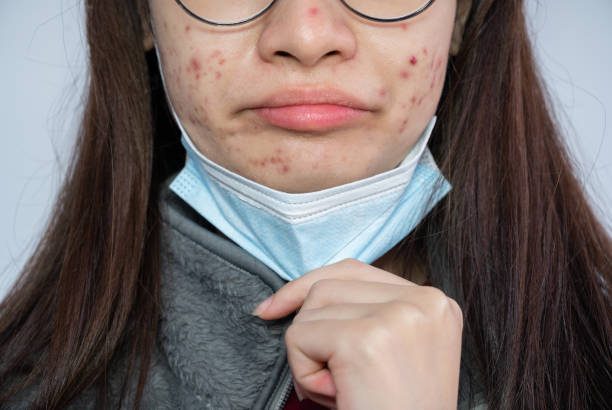

Different Types of Acne Scars
Ice Pick Scars
Ice pick scars look like tiny holes on the skin and are caused by cystic acne. **They** can be hard to treat. Treatments include using fillers and lasers. To prevent ice pick scars, don’t pick or squeeze acne.
Boxcar Scars
Boxcar scars are big holes on skin from acne. Treatments like microneedling and laser therapy can help. It’s important to treat acne early to prevent boxcar scars.
Rolling Scars
Rolling scars are bumpy marks from bad acne. Doctors can fix them by cutting bands, poking skin, or filling dents. Using retinoids and vitamin C at home can help make rolling scars better.
Hypertrophic Scars
Hypertrophic scars are thick raised scars that happen when the body makes too much collagen while healing. They look bumpy on the skin unlike other acne scars that leave dents.
Acne marks vs Acne scars
Causes
Acne marks are spots left after a pimple is gone. They can be red or brown, but usually disappear by themselves.
Acne scars are dents or bumps on the skin that last forever because of damage.
Acne marks and scars happen when skin gets hurt during a breakout. Picking at pimples can make scars worse.
The sun can make marks and scars darker. Use sunscreen to protect your skin.
Prevention
To stop acne scars, treat acne quickly and well to lower swelling and avoid scars.
Don’t touch your pimples because it can make scars. Just let them get better on their own.
Washing your face gently, scrubbing off dead skin, and putting on lotion can stop pimples that cause scars.
Eating healthy, exercising, and staying calm can help stop acne scars.
Treatment
There are many ways to treat acne marks and scars, like creams, lasers, peels, needles, and dermabrasion.
Creams with retinoids or hydroquinone can help fade acne marks by making skin cells renew faster.
Laser therapy helps make scars better by making more collagen and improving skin. You might need more than one session for the best results.
Chemical peels take away the top skin layer to show smoother skin below. They can make mild acne scars look better.
Microneedling uses small needles to make tiny cuts in the skin, which helps make scars less visible by boosting collagen.
Dermabrasion is a surgery to make acne scars look better by smoothing the skin. You need time to get better after the surgery.
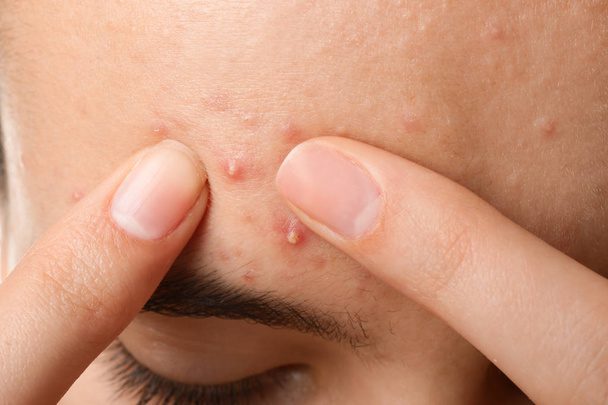

Depressed acne scars
Ice Pick Scars
Ice pick scars are small holes in the skin caused by inflamed acne.
Dermatologists have a hard time treating deep scars. They suggest punch excisions or laser resurfacing to help.
Ice-pick scars can make people feel bad about how they look and affect how they act around others.
Boxcar Scars
Boxcar scars look like pits on the skin, similar to chickenpox scars.
To fix boxcar scars, doctors can use fillers, lasers, or peels. These make skin better and reduce scars.
If you have boxcar scars, it can make you feel sad because of the dents on your skin. Getting help can make you feel better and more confident.
Rolling Scars
Rolling scars make the skin bumpy and not smooth. They happen when there is damage under the skin.
Dermatologists can fix bumpy scars with treatments like subcision, microneedling, or laser therapy. These treatments help make the skin smoother by creating more collagen.
Rolling scars can make people feel not good about how they look, especially when they are with others who might judge them because of their skin.
Preventing Acne Scars
Early Treatment
It’s important to treat acne early to stop scars. Dermatologists say to use retinoids or benzoyl peroxide for acne to stop scars.
To fix acne scars, start treatment early. If you wait, scars can get worse and need stronger treatments like lasers or peels. So, get help early to keep your skin clear and healthy.
To stop acne scars, get help early. Don’t wait for acne to get worse. Treat it when it starts to keep skin nice and clear.
Avoiding Manipulation
Don’t touch pimples to stop acne scars. Picking or popping them can make it worse. Get help from a pro for good skin care tips.
Don’t touch or pop pimples because it makes them take longer to heal and can cause scars. Keep your hands off your face to avoid making it worse.
Don’t touch your pimples! It’s hard but important. Clean your face gently and use treatments from a skin doctor. If you leave them alone, your skin can heal better without scars.
Skin Care Essentials
Taking care of your skin is super important to avoid acne scars. Wash your face every day with a gentle cleanser to get rid of dirt and oil that can make pimples. Use moisturizers that won’t clog your pores to keep your skin fresh and healthy.
It’s super important to use sunscreen every day to keep your skin safe from the sun. Find a sunscreen with SPF 30 or more to protect your skin well.
To take care of skin with acne, wash it gently two times a day, then use a moisturizer without oil and sunscreen in the morning.
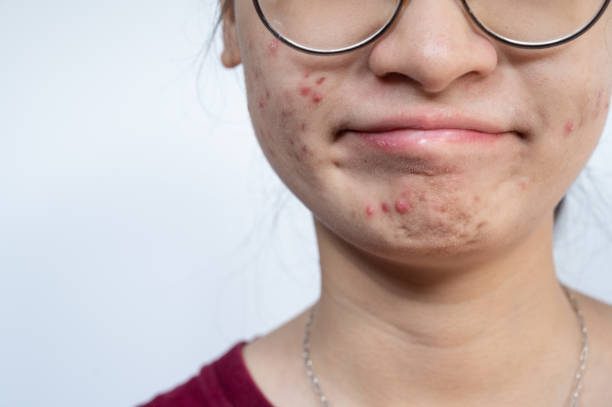

How to remove acne scars naturally
natural remedies
Put aloe vera gel on the red spots to make them go away and help your skin heal. A mask with honey and cinnamon can also help make acne scars less visible over time.
Coconut oil makes skin soft and fades acne scars. Lemon juice can lighten scars when used often.
Green tea helps with acne and healing. Rosehip oil is good for the skin and scars.
lifestyle changes
Eating fruits, veggies, and whole grains is good for your skin. Drinking lots of water helps heal acne scars.
Exercising helps skin heal faster by giving it good stuff. Sleeping enough at night makes skin look better by fixing acne marks.
Don’t pick at pimples to stop scars. Use products that don’t clog pores to prevent more pimples and scars.
professional treatments
Dermatologists can make acne scars look better with treatments like chemical peels, microdermabrasion, or laser therapy. These treatments help by taking off damaged skin layers to show nicer, healthier skin.
Dermatologists can use microneedling to make acne scars better. They might also suggest corticosteroid injections to help with swollen scars.
For really bad acne scars, doctors might need to do surgery to take out the scars. It’s important to see a skin doctor for the best way to treat acne scars.
Is Vaseline good for scars?
Healing Properties
Vaseline helps scars heal by keeping them moist and reducing their visibility.
Vaseline can make scars less noticeable by softening the skin. This helps with acne scars.
Vaseline can protect scars and help them heal without any disturbance from outside stuff.
Potential Drawbacks
Don’t put Vaseline on cuts or pimples because it can trap germs and cause infections.
Sometimes Vaseline can be too heavy for some skin, which might clog pores and make acne worse.
Vaseline helps some scars, but not all. Ask a skin doctor for bad scars.
Application Techniques
Put a little Vaseline on your clean, dry skin to help scars.
To make it better, rub Vaseline gently on the scar in circles. This helps blood flow and makes the skin absorb it.
To keep your skin healthy, wash it well before using Vaseline to avoid blocked pores. Also, check if you’re allergic to any Vaseline ingredients.
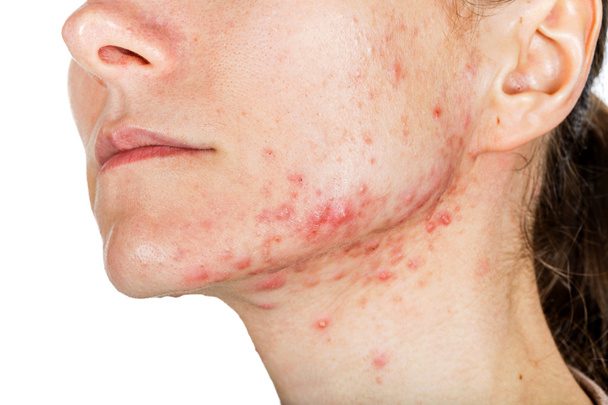

How long does it take for acne scars to fade
Factors Affecting Acne Scar Fading
Hormones: Hormones can make acne scars take longer to heal.
Skin Type: Each skin type reacts differently to treatments, which affects how quickly acne scars go away.
Treatment Methods: The treatment you use affects how fast acne scars go away.
Impact of Lifestyle Choices
Eating good food and drinking water can help you heal faster.
Exercising helps blood flow and makes skin cells grow back.
Staying out of the sun and wearing sunscreen can help skin heal faster and stop more damage.
Importance of Skincare Routine
Using special skincare products like retinoids or vitamin C can help scars fade faster.
Gentle scrubbing removes old skin so new skin can grow.
Putting lotion on your skin often helps it stay soft and smooth, which can make acne scars get better.
How can I fade scars at home?
Natural Remedies
Lemon juice: Lemon juice helps fade scars. Put it on for 10 mins, then wash off.
Aloe vera: Put gel on scars every day to help skin feel better and heal faster.
Eating foods with vitamin E and zinc helps skin heal. Using coconut oil or olive oil can make scars go away too.
Skincare Products
Using products with salicylic acid or retinoids can help scars fade by making new skin grow faster.
Use creams with hydroquinone to make dark spots and acne scars go away.
Lifestyle Changes
Don’t pick or squeeze acne because it makes scars worse. Use sunscreen to protect your skin from the sun and stop more damage.
To keep your skin healthy and help scars fade, wash your face two times a day and use moisturizer regularly.
Effective Acne Treatments
Topical Solutions
You can use special creams to help make acne scars look better. These creams have good stuff like retinoids and vitamins that can help heal your skin and make scars less visible. Some popular creams are Mederma, Bio-Oil, and silicone gels.
When using creams for scars, remember that results can be different for everyone. Some may see big changes, while others might not see much. To make the cream work better, use it regularly as told by experts.
If you want to pick the best skin medicine, it’s smart to talk to a skin doctor. They can check your skin and suggest the right treatment for your scars. Using different treatments together can make your skin better.
Medical Procedures
Doctors can use special treatments to help bad acne scars that don’t go away with creams. They can use lasers, tiny needles, special peels, or sanding to make the scars look better. These treatments help make more collagen, fix the skin, and make it smoother.
Different treatments help with acne scars, but they all have good and bad things. Laser helps a lot but needs many sessions. Microneedling makes collagen grow but can make skin red and swollen for a bit. Knowing these things is important to choose the right treatment for acne scars.
New fancy medical tools help make scars go away. Lasers and microneedles are cool ways to fix acne scars fast. Knowing about these new things can help people find better ways to get rid of their scars.
Home Remedies
You can use things like aloe vera, honey, tea tree oil, and lemon juice to help make acne scars go away. You can mix these things together to make face masks or scrubs at home.
Home remedies help the skin and make it healthy. Be careful to avoid any bad reactions by testing first.
To make home remedies work well, use them all the time. Keep using them for a long time to see the scars look better. But remember, it might take longer for natural remedies to show changes than treatments at the doctor’s office.
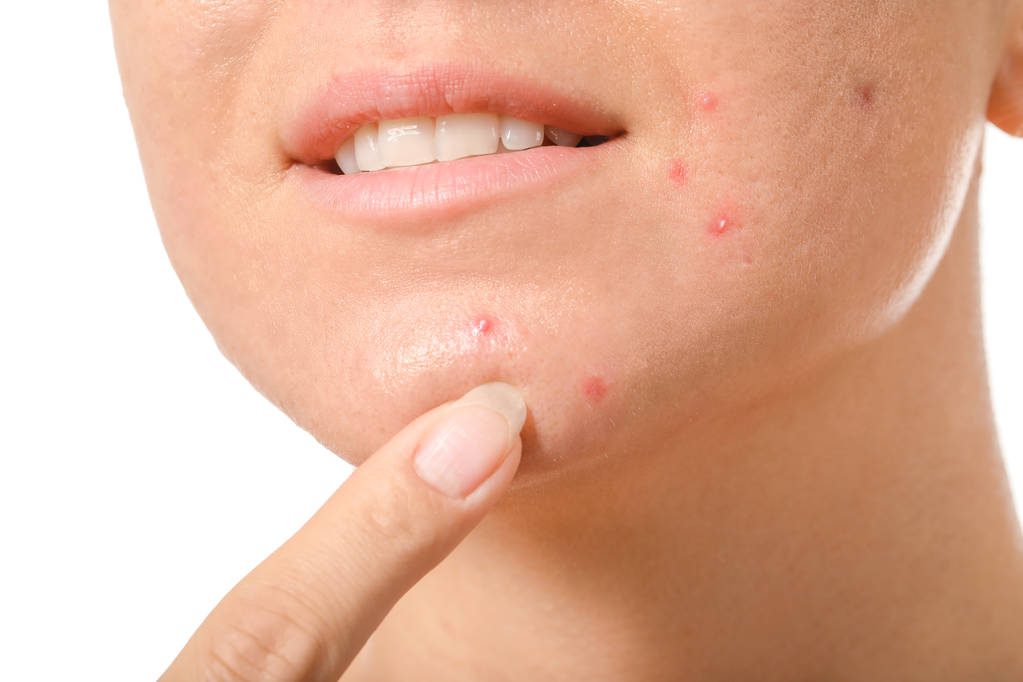

Treatment Options for Acne Scars
Atrophic Scars
Atrophic scars are dents in the skin from tissue loss. Microneedling and dermal fillers can help improve these scars by making skin smoother and filling in the dents.
Acne can make you sad inside and outside. Laser therapy helps by fixing the skin and making it smoother. If your scars are serious, subcision might be suggested. It breaks up the tough stuff under the scars for better skin.
Hypertrophic and Keloid Scars
Raised scars called hypertrophic and keloid scars can be treated with shots or gel sheets. The injections help make the scar smaller and less swollen, while the gel sheets can make the scars softer and flatter.
Cryotherapy can help make big scars smaller by freezing them. Sometimes, surgery is needed for really bad scars that won’t go away with other treatments.
Post-inflammatory Hyperpigmentation
Dark spots after pimples can be helped by using creams or peels. Creams like retinoids make skin cells renew faster, fading spots. Peels remove top skin layer to show smoother skin.
To fix dark spots on skin, lasers can be used to target them without hurting other skin. Also, using brightening serums with vitamin C can help make dark spots lighter if used regularly.
Understanding Scar Risk Increase
Infection Risk
Not cleaning acne scars can cause infection. Bacteria can get in and make it worse. To stop infections, keep the area clean and don’t touch the scars.
Infections can make acne scars worse. Bacteria can stop scars from healing, making them look even worse. Taking care of wounds is important to prevent infections.
To keep acne scars clean and avoid infections, use gentle cleansers and skip harsh skincare stuff. If you think there’s an infection, see a skin doctor for help.
Delayed Healing
Not taking care of your skin well, having health issues, or genes can make acne scars take longer to heal. Slow healing can lead to scars that stay for a long time and change how your skin looks.
Taking too long to heal can make scars look bad forever. Use special creams like retinoids or vitamin C to help acne scars heal faster.
Eating good food and moving your body helps your skin stay healthy and heal faster. It’s important to be patient and ask an expert if you have any worries about your acne scars getting better.
Preventing Scar Formation
Intervention Strategies
It’s important to stop scars by acting early when acne starts. Being smart can help stop scars for good. One way is to not pick or squeeze pimples, which can make them worse and cause scars.
It’s important to keep your skin clean and use products that won’t clog pores to avoid acne. Using sunscreen regularly can protect your skin from the sun and help scars heal better. Gentle exfoliation can make your skin look better and reduce scars.
It’s important to get help from experts for acne scars. Dermatologists know a lot and have cool treatments to make scars look better. They can suggest creams or do special procedures like peels, needles, or lasers for different kinds of scars.
Getting help from a doctor is super important for fixing acne scars. They can make a special plan just for your skin to help make the scars go away. Doctors know how to treat old scars and also stop new ones from showing up, which helps keep your skin healthy in the long run.
Professional Care Importance
To make acne scars better, it’s important to ask experts for help. Dermatology or aesthetics doctors know how to check your skin and suggest the right treatments. Letting professionals handle your scars means you get personalized options for your skin and scars.
Getting help from pros for scars is not just about making them look better. They also help you feel better inside by giving you support and advice. Pros know how acne scars can make you feel bad about yourself, so they give you care and treatments that work. They keep checking on your skin to make sure everything is going well with the treatments.
To pick the best doctor for acne scars, check their qualifications and experience. Find someone who’s good at treating acne scars. Talk to a few doctors to find one that matches what you want.
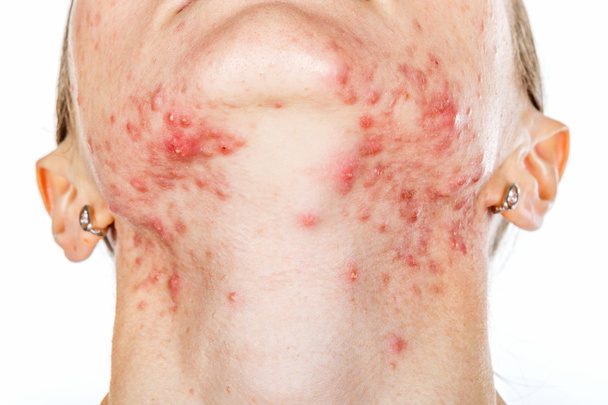

Acne Scarring Why It Happens
Biological Processes
Acne scars happen when pimples hurt the skin and make it look different. Skin tries to fix itself but sometimes makes too much or too little stuff, causing different scars.
Our body can make too much collagen when it gets inflamed, causing keloids. Hormones, like testosterone, can make acne worse by making more sebum that blocks pores and helps acne grow.
Sometimes, when your body changes a lot, like during puberty or your period, it can make pimples worse and cause scars. If your hormones are not balanced, you might get a lot of pimples and really bad scars. It’s important to know about these body changes to help get rid of acne scars.
External Influences
Sun can make acne scars darker. Popping pimples can hurt your skin and make scars worse. Protect your skin from the sun and don’t pick at acne to keep scars from getting worse.
Smoking and bad food can make it hard for your skin to heal. Smoking stops blood from reaching your skin, which makes it tough for your skin to fix itself after pimples. Eating good food with lots of vitamins can help your skin stay healthy and heal scars better.
To stop acne scars from getting worse, use the right skincare stuff for your skin every day. Use gentle cleaners, non-greasy lotions, and sunscreen. Don’t use harsh products that can make your skin angry and make scars worse.
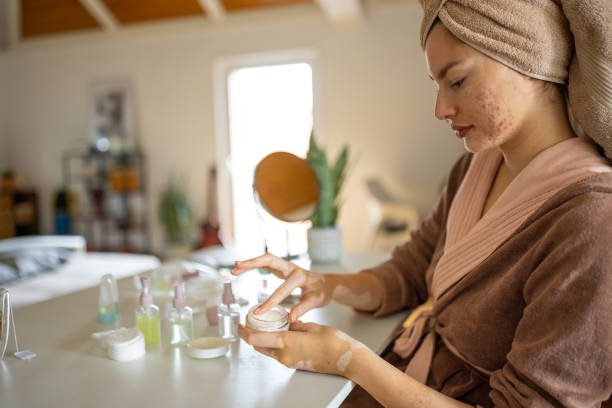

New Research and Innovations
Advanced Treatments
New ways to fix acne scars are helping skin doctors a lot. They use cool stuff like lasers and microneedling to make the scars look better.
New treatments help make scars look better by making more collagen in the skin. Laser therapy is one of these treatments. It helps fix damaged skin and makes new, healthy skin grow, which makes scars less noticeable.
Microneedling makes small holes in the skin with tiny needles to help the skin heal better. This helps make more collagen and lets skincare products work better for treating acne scars.
Emerging Technologies
New ways like radio waves and peels are helping to make acne scars better. Radio waves heat up the skin to make it tighter and boost collagen.
Chemical peels make your skin peel off to show smoother skin and reduce scars.
New fancy tech helps people pick best treatment for acne scars. Talk to a skin doctor who knows these cool ways to get a plan just for you.
Preventive Strategies
Researchers are looking at ways to stop acne scars before they happen. Using retinoids early can help prevent bad acne spots that stick around.
Adding niacinamide and vitamin C to your daily skincare helps keep your skin healthy and strong against scars. These ingredients protect your skin and make it smooth, reducing the chance of scars.
Summary
It’s important to know why acne scars happen so we can stop them. By understanding how acne is touched, who gets scars more, and how they form, we can stop scars from happening. Different types of scars need different treatments, so it’s important to treat acne well. Taking care of your skin and asking for help can help stop acne scars from sticking around.
Learn about new ways to treat acne scars and stay updated on the latest options. Control your skincare routine, focus on preventing acne, and talk to skin doctors for personalized solutions to get rid of acne scars.
Frequently Asked Questions
What Causes Acne Scars?
Acne scars form when the skin tissue is damaged during the healing process of acne. Inflammatory acne, such as cysts or nodules, are more likely to cause scars due to their impact on deeper layers of the skin.
Is Vaseline good for scars?
Vaseline can help keep a wound moist and promote healing, but it may not be the best option for all scar types. Consult with a dermatologist to determine the most suitable scar treatment for your specific needs.
How long does it take for acne scars to fade?
The time it takes for acne scars to fade varies depending on the type of scar and individual skin healing processes. In general, it can take several months to years for acne scars to visibly fade, with consistent treatment and care.
How can I fade scars at home?
You can try natural remedies like aloe vera, honey, or lemon juice to help fade scars at home. However, results may vary, and it’s essential to consult with a dermatologist for personalized advice and treatment options.
Why do I always have acne scars?
Repeatedly picking or squeezing acne blemishes can lead to scarring. Genetic factors, skin type, and severity of acne can contribute to persistent acne scarring. Proper skincare routine and professional treatments can help manage and prevent future scarring.

